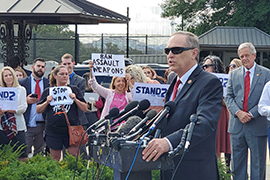- Slug: BC-CNS-Gun Sparring,830
- Photo available (thumbnail, caption below)
By Wissam Melhem
Cronkite News
WASHINGTON – A new report claims that Arizona loses as much as $1.9 billion every year to costs directly associated with gun violence, from lost wages to expenses on everything from health care to police and criminal justice.
That number balloons to $5.4 billion when indirect costs, such as the “reduced quality of life attributable to pain and suffering,” are factored in for the state, according to the study by the Giffords Law Center to Prevent Gun Violence. The state-by-state report said that gun violence nationwide costs the economy $229 billion a year in direct and indirect costs.
The report was part of a day of partisan skirmishing across Capitol Hill that saw Democrats and Republicans holding competing press conferences and a House committee voting – along party lines – for a bill directing the Education Department to better track and report on school shootings.
Speaking in front of the Capitol with a group of fellow Republicans Wednesday afternoon, Rep. Andy Biggs, R-Gilbert, said that recent mass shootings should be blamed on the evil of the shooter and not the guns they use.
“You know what drives the evil and the mass killings that we see from time to time in this country?” Biggs asked. “It isn’t the instrumentality, it is evil in the heart of somebody.”
But Rep.Carolyn Maloney, D-N.Y, said earlier in the day that the U.S. is “standing alone” when it comes to the number of deaths caused by guns, citing statistics that show Americans are 25 times more likely to die from gun violence than residents of nations like France, Canada or Germany.
“Shame on us for not acting to protect our people,” Maloney said. “More people have died from gun violence than World War II in recent years because of the mass shootings.”
Her comments came at a news conference during which the Giffords report was released, claiming to show the economic impact of gun violence on every state, as well as the number of homicides, suicides, non-fatal shootings and accidental shootings each year.
The study said that nearly 71% of Arizona gun deaths were suicides and more than 57% of those suicide involved firearms.
Maloney said gun-control laws can be effective, pointing to her home state of New York where just 0.3% of the state GDP is affected by gun violence, compared to 1.5% in Arizona, according to the report. Maloney attributes New York’s low rate to the state’s strict gun laws.
Across the Hill, House Republicans pushed back hard against the notion that gun-control works, saying they infringe on people’s constitutional rights.
Rep. Steve Scalise, R-La., who was wounded in a 2017 attack at a baseball practice in Virginia with other Republicans, criticized Democrats who rush to “find a microphone, not to pray for the victims but to promote their own gun-control agenda” after a shooting.
“There are people who use guns legally every single day to protect themselves from criminals and we ought to fight to protect the rights of those law abiding citizens,” Scalise told the crowd at the Tea Party Patriots event. “These are not rights that Congress gave, these are enshrined in our Constitution.”
A popular target for Republicans was former Texas Rep. Beto O’Rourke, who said at a recent Democratic presidential primary debate that he would take away people’s AR-15s and AK-47s. Rep. Thomas Massie, R-Ky., said O’Rourke was only saying what those who claim to support “common-sense” gun control are thinking.
“They would prefer to take every single gun back,” Massie said. “That is a recipe for destroying this country … Beto’s proposition is the first step in a full confiscation.”
The GOP rally came shortly after the House Education and Labor Committee voted on a bill that would direct the Department of Education to annually track statistics pertaining to school shootings. It would also create a federal definition of “mass shooting” and “school shooting.”
The bill passed on a party-line vote as House Democrats said it would lay the necessary groundwork to find efficient solutions for the “epidemic” facing the country. Republicans on the committee tried unsuccessfully to amend the bill but did not otherwise debate it before voting against it as a bloc.
While the House goes back and forth, the GOP-controlled Senate has yet to take action on gun-control bills passed by the House earlier this year, including one bill from February that would expand the types of gun sales requiring background checks on the buyers.
Senate Majority Leader Mitch McConnell has said he does not see a point in bringing up bills that will be vetoed by President Donald Trump, and he told reporters earlier this week that he is still waiting for word from the administration on which path the president would like to take.
“I still await guidance from the White House as to what (Trump) thinks he’s comfortable signing,” McConnell said. “If and when that happens, then we’ll have a real possibility of actually changing the law and hopefully making some progress.”
For more stories from Cronkite News, visit cronkitenews.azpbs.org.
^__=
Web links:
_ National report: https://www.jec.senate.gov/public/_cache/files/b2ee3158-aff4-4563-8c3b-0183ba4a8135/economic-costs-of-gun-violence.pdf
_ Giffords, Arizona numbers: https://lawcenter.giffords.org/wp-content/uploads/2017/12/Cost-of-Gun-Violence-in-AZ.pdf
_ School shooting bill: https://www.congress.gov/116/bills/hr4301/BILLS-116hr4301ih.pdf
_ Background checks bill: https://www.congress.gov/116/bills/hr8/BILLS-116hr8pcs.pdf
_ Background checks vote: http://clerk.house.gov/evs/2019/roll099.xml
^__=
Rep. Andy Biggs, R-Gilbert, is flanked by supporters and opponents of gun-control bills at a Republican rally outside the Capitol in support of the Second Amendment on Wednesday. (Photo by Wissam Melhem/Cronkite News)
